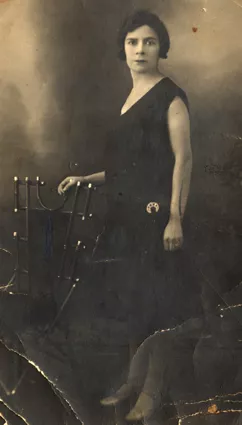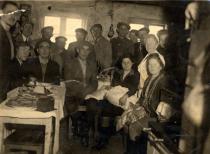This is my mother Gitl Kagan before getting married. Early 1920s, Siauliai.
My mother Gitl Kagan was born in Seduva in 1900. She was the youngest in the family. Mother did not tell hardly anything about her education and life in Seduva. She got elementary education and knew hot to read and write in Yiddish. When she was in her teens, she became the apprentice of a milliner. Mother turned out to be a good seamstress. After World War One, mother's family moved to Siauliai, where there were good conditions for development of private business. It attracted Jews from small towns, so they sought worthy opportunities in Siauliai and Kaunas. My parents met in Siauliai. My father was a cabman. During on of his trips in Lithuania, he met my mother. Despite her being four years older than him, he fell in love with her once and for all. They got married in 1927 with all rites and traditions being observed. My parents were wed under chuppah in choral synagogue of Siauliai.
My parents started renting an apartment after wedding. It lived in the same house where my father's parents-in-law were living. Grandfather Shneer rented an apartment on the second floor and we lived on the first floor. In 1929 my elder sister Chana was born. I came into the world on 19 May1933. This date is not exact. At that time the date of birth was recognized by the Jewish holidays. I know that I was born on holiday Lag ba-Omer, dated during the period of time when I was born.
Our family was not rich. We did not have our own apartment. Most of the money earned was spent on rent. Our family occupied three rooms. The house was wooden. It was heated by stove. We had solid handmade furniture. There was nothing extra, only necessary things. At any rate, every member of the family had his place to sleep. We ate at a dining table in a drawing room. Mother also used this room for work. She had two sewing machines Mother was often invited in rich Jewish homes, where she got orders for the whole families. Our kitchen was also large, though mother practically had no time for cooking. The oven which was stove which was stoked with firewood was in the center of the kitchen. It was used for heating and for cooking. The house where we were living was next to a large yard with kitchen garden and orchard, owned by our landlord. I was tempted to take an apple or a plum from there. Once, my father who was a very soft and kind person, slapped me for that. There was a wooden shed in the back yard. There were horses in that shed. Those horses helped father earn money. He delivered cargo throughout Lithuania.
Our family had a modest living. I remember that parents had a long discussion before buying us anything as they wanted to save money and to buy cheaper things. Besides, mother made most of the clothes for us. As for the food, it was lavish and delicious, though no dainties. We had meat every day, not only on the weekend. Meat was bought in kosher stores. Poultry was taken to shochet in the synagogue. An old shochet with a long beard cut the fowl, hang it over the tub for the blood to trickle down and then gave it to me. He did it in line with kashrut rules.




















